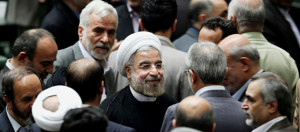
Stating that Russia and Iran have negotiated and reached an agreement only on the development of bilateral cooperation in the oil and gas industry, the Oil Minister of the Islamic Republic said, “On this basis, Iran will use the technical and operational capacity of Russian companies in the oil and gas industry”. He also stated that he knew nothing about the statements of the Russian Minister of Economic Development about the exchange of oil for supplies between the two countries.
In September this year, Russian Energy Minister, Alexander Novak, within the framework of the continuing meetings of the Joint Intergovernmental Russian-Iranian commission on trade and economic cooperation in Tehran, answering questions posed by the Iranian news agency, Mehr regarding Russian oil produced in the Urals, and some samples of Iranian crude oil, commented on the possibility of Iranian oil in exchange for goods from Russia. Then the minister added that no such agreement has been signed yet, and that: “there is nothing about the intentions of exchanging oil for supplies in the joint economic memorandum for the time being».
On 21 September, the Ambassador of the Republic of Azerbaijan in Moscow said that his country is ready for trilateral cooperation in terms of the exchange of supplies of Iranian oil in Russia and stressed that his country can negotiate on this issue with Russia and Iran. At the same time last week, in one of his articles posted in the Moscow Times, it was reported that Russia may this year start sending its goods to Iran on the basis of the contract which presupposes «the exchange of oil for goods».
On December 5, Russian Minister of Economic Development, Alexei Ulyukayev announced, “It is possible that the implementation of this agreement will begin before the end of this year”.
On the other hand, the other day the U.S. State Department spokesman, Jennifer Psaki, stressed that “Washington is aware of the negotiations between Russia and Iran, and if the United States considers that this exchange agreement violates international sanctions against Iran, the U.S. will respond as appropriate”.
According to the news agency Mehr, the project of compensatory supplies of the delivery of Iranian oil to Russia due to a significant similarity of some of its raw samples to those that are produced in the Russian Urals, for almost two years has been receiving different assessments of various official representatives of Russia, Iran and even the United States. Initially, this plan was approved by the senior leadership of Russia and Iran.
Back in early 2014, the First Vice President of Iran, Eshaq Jahangiri, when informing reporters about the details of the Russian-Iranian talks on exchange of oil for goods and the beginning of the implementation of the swap delivery project, “In the course of negotiations with the Russian side, we put forward several proposals regarding the exchange of a considerable amount of petroleum resources for finished products. Some expressed their disagreement with this, but I have to say that if Russians will not work in the Iranian market, there will be others that take their place”.
Following this, the Iranian ambassador to Russia, Mehdi Sanayee, in an interview with the newspaper “Kommersant” confirmed negotiations between Moscow and Tehran on the exchange of oil for goods, commenting that “to compensate for the cost of Iranian oil, Russia could create a second reactor for the Bushehr nuclear power plant, export trucks, railways or other products, as well as build small factories for our country”.
What could be the reason for such contradictory statements from the both sides? Judging by everything, it may have something to do with Washington putting pressure on Iran along with American threats to toughen its stance in negotiations on the Iranian nuclear program. That was expressed clearly after the visit of President Vladimir Putin to India . “We continue to call on all countries not to do business with Russia”, U.S. State Department spokesman Jen Psaki said at a briefing.
She also stressed that the US is following all the contracts entered into with Moscow. During the visit, there were a number of documents signed on cooperation in various fields. Earlier the United States expressed concern about the negotiations between Russia and Iran and threatened Moscow with new sanctions.
It is clear that the US is closely watching new Russian contracts. Therefore, the signing of 16 agreements between India and Russia did not remain unnoticed by them. And Washington has already responded to the incident, calling on all countries to refuse deals with Moscow. By the way, this statement by Psaki has already been commented on by Russian Deputy Prime Minister Dmitry Rogozin. He noted that the United States reminds us of “evil little children” who “rejoice in other people’s failure and envy other people’s success”.
It will be unfortunate if Tehran has decided not to take up the implementation of the agreement on «exchange of oil for goods». After all, it would enable Iran to obtain the necessary industrial products and engineering services without paying currency.
One can understand the Iranians. They want to achieve the lifting of sanctions through a deal on the Iranian nuclear program. But what guarantee is there that the US will make concessions to Iran if Tehran keeps aloof from cooperation with Russia? Or Washington will push through such conditions that the Iranians will lose control over its oil and gas sector. In addition, we must not forget that the main objective of Washington is to change the current regime in Tehran, replacing it with a pro-Western regime.
Alexander Orlov, political scientist, expert Orientalist, exclusively for the online magazine “New Eastern Outlook”.
